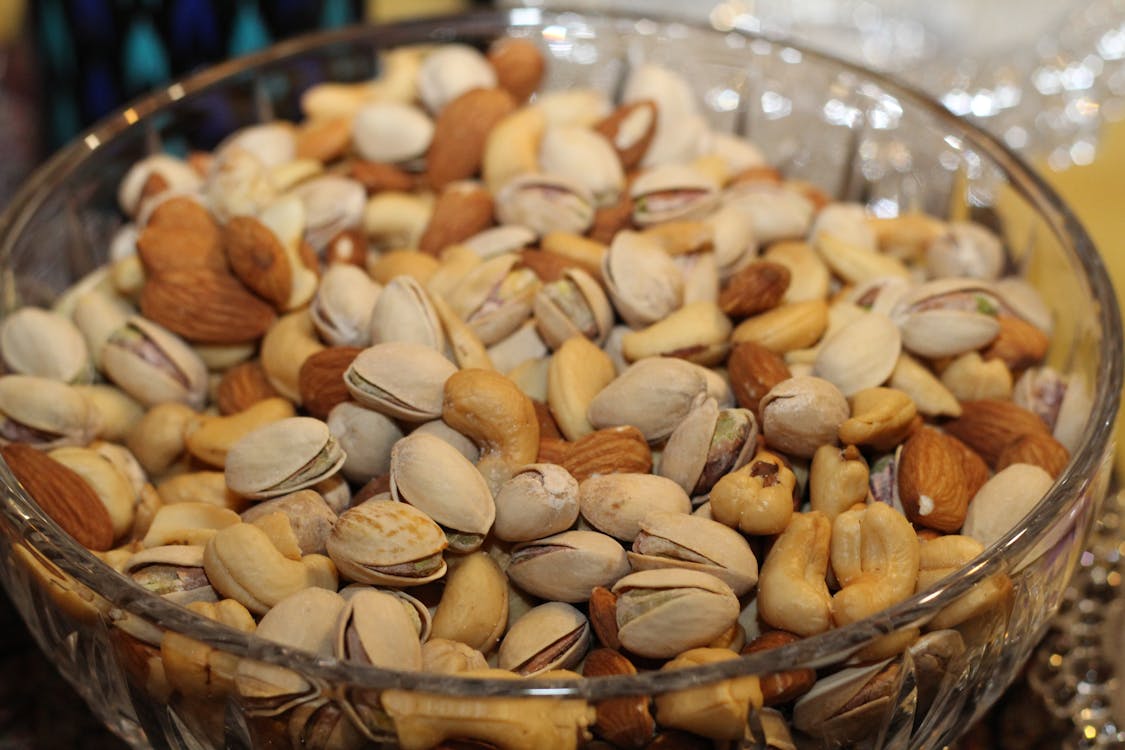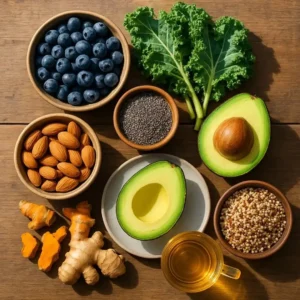
Dry fruits, also known as dried fruits or nuts, have been a staple in human diets for centuries. These nutrient-dense snacks are not only delicious but also packed with a wide array of health benefits. Whether you’re munching on almonds, savoring dried apricots, or enjoying a handful of raisins, dry fruits offer a convenient way to boost your overall well-being. In this article, we’ll delve into the numerous advantages of incorporating dry fruits into your diet.
1- Abundant in Essential Nutrients

Dry fruits are a concentrated source of essential nutrients, making them a must-have addition to your diet. Whether you’re looking to bolster your immune system, promote bone health, or simply enjoy a tasty and nutritious snack, dry fruits have got you covered. Let’s explore the myriad of vital nutrients they offer.
1. Vitamins Galore
Among the essential nutrients found in dry fruits, vitamins stand out as some of the most prominent. Almonds, for instance, are renowned for their vitamin E content. This powerful antioxidant is crucial for maintaining healthy skin, protecting cells from damage, and even reducing the risk of chronic diseases. Magnesium and calcium, also abundant in almonds, play pivotal roles in maintaining strong bones and regulating muscle function.
Meanwhile, dried apricots are a vitamin A powerhouse. This nutrient is essential for maintaining proper vision, promoting healthy skin, and supporting immune function. Alongside vitamin A, apricots contain ample potassium, a mineral vital for maintaining proper muscle and nerve function, as well as regulating blood pressure. Iron is another noteworthy nutrient present in dried apricots, which is crucial for preventing anemia and ensuring that your body gets enough oxygen.
2. Minerals for Health
Minerals are another category of essential nutrients that dry fruits provide in abundance. These include potassium, magnesium, and calcium, which play pivotal roles in maintaining overall health.
Potassium, found in dried apricots, is an electrolyte that helps regulate fluid balance, nerve signals, and muscle contractions. Adequate potassium intake is associated with lower blood pressure and reduced risk of stroke.
Magnesium, abundant in almonds, supports over 300 biochemical reactions in the body. It is crucial for muscle and nerve function, blood glucose control, and bone health. A diet rich in magnesium has been linked to a lower risk of type 2 diabetes and heart disease.
Calcium, also present in almonds, is renowned for its role in maintaining strong bones and teeth. Additionally, it aids in blood clotting, muscle function, and nerve transmission.
3. Dietary Fiber for Digestive Health
Dry fruits are an excellent source of dietary fiber, which is essential for maintaining digestive health. Fiber helps promote regular bowel movements, prevent constipation, and support a healthy gut microbiome. A diet high in fiber is associated with a reduced risk of gastrointestinal disorders, including diverticulitis and colorectal cancer.
Incorporating a variety of dry fruits into your diet can help you meet your daily fiber needs, ensuring optimal digestive function and overall well-being.
2- Heart Health Benefits: A Closer Look

When it comes to nourishing your heart, few foods can rival the impressive array of benefits offered by dry fruits. In this section, we will delve deeper into the heart-healthy properties of these nutritional gems, focusing on the remarkable contributions of nuts like walnuts, almonds, and pistachios.
1. Monounsaturated and Polyunsaturated Fats
Nuts, particularly walnuts, almonds, and pistachios, are replete with heart-protective monounsaturated and polyunsaturated fats. These healthy fats have garnered attention for their ability to improve cardiovascular health. They play a pivotal role in reducing the levels of LDL (low-density lipoprotein) cholesterol, often referred to as “bad” cholesterol, in the bloodstream. Elevated LDL cholesterol is a major risk factor for atherosclerosis, a condition characterized by the buildup of plaque in the arteries, ultimately leading to heart disease.
Consuming nuts as part of a balanced diet can effectively lower LDL cholesterol levels, thereby diminishing the risk of heart disease. In addition to reducing harmful cholesterol, these fats have been associated with increased levels of HDL (high-density lipoprotein) cholesterol, known as “good” cholesterol. HDL cholesterol helps remove excess LDL cholesterol from the bloodstream, further protecting your heart.
2. Dietary Fiber’s Role in Heart Health
Dry fruits, including nuts, are not just about fats; they are also excellent sources of dietary fiber. Fiber is a cornerstone of heart health for several reasons. One of its primary benefits is its ability to maintain healthy blood pressure levels. By promoting blood vessel flexibility and reducing arterial stiffness, fiber contributes to optimal circulation and blood pressure regulation.
Furthermore, fiber-rich diets are linked to a lower risk of heart disease and stroke. Soluble fiber, found in abundance in dry fruits like almonds, forms a gel-like substance in the digestive tract. This gel can bind to cholesterol molecules, helping to remove them from the body and lower cholesterol levels. As a result, the risk of plaque formation in the arteries is reduced, mitigating the risk of heart disease.
3. Antioxidants and Heart Protection
Nuts and dried fruits also boast a rich supply of antioxidants, which provide additional protection to your heart. These antioxidants, including vitamin E and polyphenols, help combat oxidative stress and inflammation. Oxidative stress and chronic inflammation are key factors in the development and progression of cardiovascular diseases.
By neutralizing harmful free radicals and reducing inflammation, antioxidants help preserve the health and function of blood vessels and reduce the risk of atherosclerosis. This, in turn, lowers the likelihood of heart attacks and strokes.
3- Weight Management: The Surprising Role of Dry Fruits

If you’re on a quest for effective weight management, it might seem counterintuitive to include dry fruits in your diet, considering their reputation for being calorie-dense. However, it’s time to debunk the myth that these delightful morsels can hinder your progress. In fact, dry fruits can be a valuable ally in your weight management journey. Let’s explore how their unique combination of fiber, protein, and other nutrients can contribute to a healthier you.
1. Fiber: The Satiety Superpower
Dry fruits are rich in dietary fiber, an essential component of weight management. Fiber has a remarkable ability to create a feeling of fullness and satisfaction, which can curb your appetite and prevent overeating. When you consume fiber-rich foods like dry fruits, they take up space in your stomach and slow down the digestion process. This extended feeling of fullness can help you eat less during your meals and resist the temptation to snack on unhealthy options between them.
Fiber also has the added benefit of regulating blood sugar levels. By slowing the absorption of sugar, it can help prevent the rapid spikes and crashes in energy that often lead to cravings for sugary or high-calorie foods. In this way, a diet rich in fiber can contribute to more stable energy levels and fewer cravings for unhealthy snacks.
2. Protein: The Satiety Enhancer
Dry fruits are not just about fiber; they also contain protein, another key player in the weight management game. Protein is well-known for its ability to promote feelings of fullness and reduce appetite. When you consume protein-rich dry fruits like almonds or pistachios, you’re providing your body with the building blocks it needs for muscle repair and growth.
Moreover, the thermic effect of food (TEF), which refers to the energy expenditure required to digest and metabolize nutrients, is higher for protein compared to carbohydrates or fats. This means that your body burns more calories processing protein-rich foods, contributing to weight management efforts.
3. Healthy Nutrients for a Balanced Diet
Dry fruits offer a valuable source of essential nutrients, making them a smart choice for those aiming for weight control. When you’re managing your weight, it’s crucial to focus on overall nutrition and avoid empty calories. Dry fruits are packed with vitamins, minerals, and antioxidants that nourish your body and support overall health.
By including dry fruits in your diet, you can satisfy your sweet tooth without resorting to sugary, high-calorie snacks. This helps you strike a balance between enjoying your favorite treats and maintaining a calorie-conscious approach to weight management.
4- Excellent Antioxidants: The Defense System of Dry Fruits

When it comes to safeguarding your health and promoting longevity, dry fruits emerge as potent allies, thanks to their impressive arsenal of antioxidants. These natural compounds play a pivotal role in countering oxidative stress and the damaging effects of free radicals within your body. In this section, we’ll explore the rich antioxidant content of dry fruits, focusing on the contributions of vitamin C, found in dried cherries and apricots, and vitamin E, which abounds in almonds.
1. The Battle Against Oxidative Stress
Oxidative stress is a physiological process that occurs when there’s an imbalance between harmful free radicals and the body’s antioxidant defenses. Free radicals are highly reactive molecules that can damage cells, proteins, and DNA, ultimately leading to various chronic diseases and accelerating the aging process. Fortunately, dry fruits are brimming with antioxidants, which act as your body’s frontline defense against these destructive free radicals.
2. Vitamin C: The Immune Booster
Vitamin C, also known as ascorbic acid, is a well-known antioxidant found in an array of dry fruits, including dried cherries and apricots. This vital nutrient plays a multifaceted role in protecting your health. Firstly, vitamin C bolsters your immune system, enhancing your body’s ability to fight off infections and illnesses. It supports the production of white blood cells, which are essential for immune function, and promotes the production of antibodies, the body’s natural defense against pathogens.
Secondly, vitamin C is a potent free radical scavenger. It neutralizes these unstable molecules, preventing them from causing cellular damage. By doing so, vitamin C helps reduce the risk of chronic diseases, such as cardiovascular disease and cancer, and supports healthy aging by preserving the integrity of your cells.
3. Vitamin E: Cellular Defender
Almonds, one of the stars of the dry fruit world, are exceptionally rich in vitamin E. This fat-soluble antioxidant is a vital defender of your cells, particularly those in the fatty tissues of your body. Vitamin E’s primary role is to protect cell membranes from oxidative damage, ensuring the structural integrity of your cells.
In addition to its cellular defense, vitamin E has been associated with various health benefits, including cardiovascular health. It helps maintain healthy blood vessels by preventing the oxidation of LDL cholesterol, a process that contributes to atherosclerosis and heart disease. Vitamin E’s ability to reduce inflammation also supports overall heart health.
5- Digestive Health: The Fiber-Fueled Benefits of Dry Fruits

When it comes to digestive health, dry fruits are an unsung hero. Their high fiber content makes them indispensable for maintaining a well-functioning digestive system. In this section, we’ll explore the essential role of fiber in dry fruits and how it contributes to regular bowel movements, prevents constipation, and nurtures a healthy gut microbiome. As an example, we’ll delve into the natural laxative effects of prunes, making them a popular choice for promoting digestive regularity.
1. Fiber: Nature’s Broom for Your Gut
Fiber is often referred to as “nature’s broom” for your digestive system, and dry fruits are brimming with this essential nutrient. Dietary fiber is the indigestible part of plant-based foods that adds bulk to your stool, facilitating its movement through the digestive tract. Without adequate fiber, your digestive system can become sluggish, leading to issues like constipation and irregular bowel movements.
Dry fruits like prunes, apricots, and figs are particularly rich in soluble fiber, which dissolves in water to form a gel-like substance. This gel softens the stool, making it easier to pass and preventing constipation. Insoluble fiber, found in nuts like almonds, adds bulk to the stool, promoting regularity by stimulating bowel movements.
2. Prunes: Nature’s Laxative
Prunes, in particular, have gained a well-deserved reputation for their natural laxative effect. They are packed with both soluble and insoluble fiber, making them a dynamic duo for digestive health. Prunes also contain sorbitol, a sugar alcohol known for its mild laxative properties. Together, these components help soften the stool, promote regular bowel movements, and alleviate constipation.
Additionally, prunes contain phenolic compounds and antioxidants that contribute to overall gut health. These compounds help protect the gut lining and support a balanced gut microbiome, which is essential for optimal digestion and nutrient absorption.
3. Gut Microbiome: The Key to Digestive Harmony
A healthy gut microbiome is essential for digestive well-being. The trillions of bacteria residing in your gut play a vital role in breaking down food, absorbing nutrients, and maintaining the integrity of your digestive system. Fiber-rich foods, like dry fruits, act as prebiotics, providing nourishment for the beneficial bacteria in your gut.
By fostering the growth of these good bacteria, dry fruits help maintain a balanced gut microbiome. This, in turn, supports efficient digestion, strengthens your immune system, and may even contribute to improved mental well-being, as emerging research suggests a strong connection between gut health and mental health.
6- Blood Sugar Regulation: The Sweet Surprise of Dry Fruits

The relationship between sweetness and blood sugar doesn’t always follow the expected path, especially when it comes to dry fruits. Despite their natural sweetness, many dry fruits boast a low glycemic index (GI), making them a surprising ally in blood sugar management. In this section, we’ll explore the unique properties of dry fruits that contribute to stable blood sugar levels. Whether you’re managing diabetes or simply seeking to maintain healthy glucose levels, you’ll discover how dry fruits can be enjoyed in moderation without causing dramatic spikes in blood sugar.
1. The Glycemic Index Demystified
The glycemic index (GI) is a measure that ranks foods based on how quickly they raise blood sugar levels after consumption. Foods with a high GI are rapidly digested and cause a sharp increase in blood sugar, while those with a low GI release sugar gradually, resulting in a more stable and sustained blood sugar response.
Many dry fruits, despite their inherent sweetness, fall into the low to moderate GI range. This means that they do not lead to the rapid spikes in blood sugar associated with high-GI foods. Instead, they provide a gradual and sustained source of energy, which can be particularly beneficial for individuals who need to manage their blood sugar levels.
2. Fiber: The Blood Sugar Stabilizer
One of the key factors contributing to the low GI of dry fruits is their fiber content. Fiber is an indigestible carbohydrate that slows down the absorption of sugar in the bloodstream. Dry fruits like apricots, raisins, and prunes are rich in dietary fiber, which helps maintain stable blood sugar levels by preventing sudden sugar rushes.
Fiber also contributes to feelings of fullness and satiety, which can be advantageous for individuals trying to manage their weight or control their appetite. By reducing the urge to snack on high-sugar, high-calorie foods, dry fruits indirectly support blood sugar regulation.
3. Natural Sugars vs. Added Sugars
It’s important to distinguish between natural sugars found in whole, unprocessed foods like dry fruits and added sugars found in many processed snacks and beverages. While natural sugars can still affect blood sugar levels, they are typically accompanied by fiber, vitamins, and minerals that mitigate their impact. In contrast, added sugars, such as those in sugary sodas or candy, can cause rapid and pronounced spikes in blood sugar.
Choosing dry fruits as a snack option means you’re opting for natural sugars that come bundled with a range of healthful nutrients. This choice is generally more favorable for blood sugar regulation than consuming highly processed, sugary foods.
Conclusion
Dry fruits are an exceptional addition to a balanced diet, offering a plethora of health benefits. From supporting heart health and aiding in weight management to providing essential nutrients and antioxidants, these nutrient-dense snacks are a convenient way to enhance your overall well-being. However, it’s important to consume them in moderation, as they are calorie-dense. So, next time you’re in need of a wholesome snack, reach for a handful of dry fruits and savor the many advantages they bring to your health.




